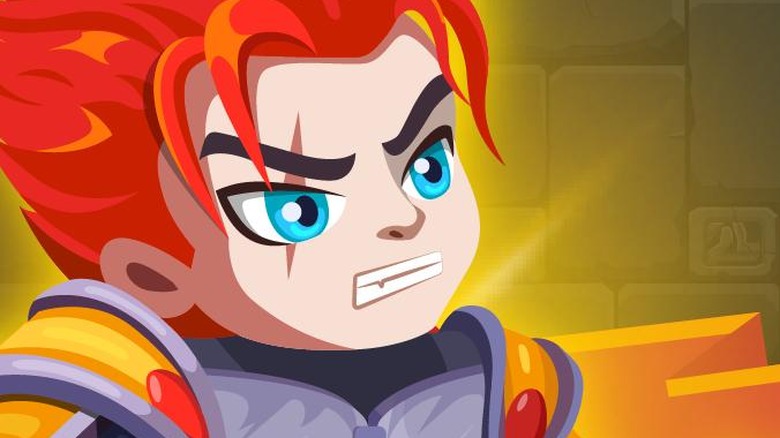This Developer Fought The Most Foul Practice In Gaming
Have you ever clicked on an ad for an awesome-looking mobile game, only to wind up downloading some barely-animated knockoff? That's actually a pretty common occurrence, considering how many mobile games don't resemble their advertisements in any meaningful way. It's a frustrating practice that has caused more than a few consumers to get suckered into purchasing subpar games that don't meet their expectations.
According to a report from TheGamer's Eric Switzer, there's finally a game that gives you what you were expecting. One developer has actually decided to find out what it was like to play the games in these fake ads — by going ahead and designing one.
That game is Hero Rescue, which was developed by Super Game Studios and is available on the Google Play store. The tongue-in-cheek description of the game tells players that they can finally get what was advertised. "Experience the real game you always see in the cool ads," reads the description. "Do you like adventures? Of course, they are great."
Hero Rescue is a puzzle game in which players must remove the pins in a tower in order to progress and defeat enemies. The lead character and the general design aesthetic of the game greatly resembles other mobile games like Gardenscapes. That, by the way, is another title that has been criticized by consumers for featuring gameplay that doesn't at all resemble its advertising.
There has been quite a bit of research put into figuring out how companies continue to do this. After seeing ads for the game Mobile Strike, Jess Joho of Vice decided to investigate how it's possible for game companies to get away with advertising titles in this way. How does a mobile RTS get advertised in a big-budget commercial featuring CGI military battles and Arnold Schwarzenegger that contains zero footage of the actual game itself?
Apparently, the reason this is done is because the ads are designed to attract "power players," which are users who will stick with the game beyond the initial download (and presumable disappointment). These are the players who are most likely to spend money on in-game purchases and make a bigger investment in the app, justifying the company's decision to offer the game for "free." The ads, therefore, offer a look at how someone would feel at the top of their game. Whether it's an image of millions of tanks and warships laying waste to the enemy or a horde of soldiers on horseback, it gives these "power players" an ideal to visualize.
According to Joho, "The issue stems less from the gaming industry and more from the vague language of the FTC's Truth in Advertising law—along with the perpetual speedbump of a slow justice system. Potential plaintiffs attempting to file a false advertising lawsuit against these companies would have to prove that the advertising is likely to mislead 'reasonable' consumers—which is a slippery terminology in the fast-paced, constantly developing app marketplace."
In other words, advertisers have a bit of wiggle room because they don't outright state in the commercials that the ads aren't directly representative of the product. By operating on a principle of "good faith," the ads can show lush battle scenes and net big stars for cameos. As long as the ad doesn't say, "These things are actually in the game," then it's not false advertising.
Instead, it's on the consumer to decide whether or not they want to purchase the game and check it out for themselves. The fact that the base game is free also makes a huge difference; the consumer isn't being charged unless they decide to participate in any kind of microtransactions the game provides. If the player feels ripped off, then it's essentially legally seen as their own fault for spending the cash.
So how does Hero Rescue stack up? Well, even though the game has received decent reviews, it does have something in common with the games it's parodying. "Here's the rub: Hero Rescue has the worst ad economy of all time," writes Switzer. "It's common to have to sit through an ad here or there while playing mobile games, but this game throws a 30-second ad at you every 2 levels. I timed it, and it's actually more ad time than game time."
Well, you can't have it all. Still, the game is apparently a lot of fun and, in true mobile game fashion, you can pay to have ads switched off. Either way, it's pretty great to see such an inventive response to an annoying trend in mobile gaming.

